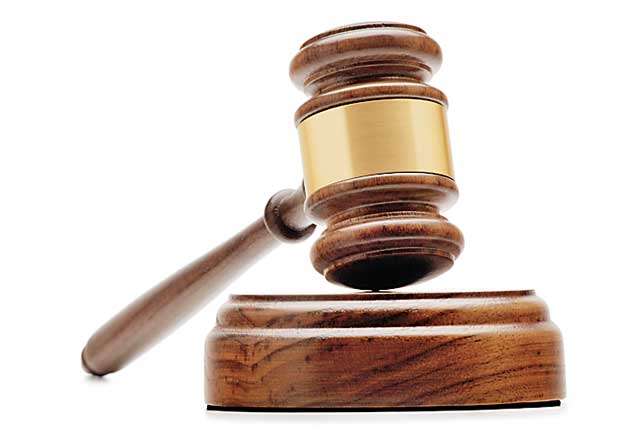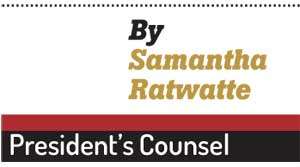19 Nov 2018 - {{hitsCtrl.values.hits}}

 overeignty in broad terms means supreme power or authority. National sovereignty accordingly, is the autonomy or the independence of a State based on this supreme power or authority. In history wars were fought to preserve sovereignty of nations and sometimes to make sovereign nations subservient or to break them up. When sovereignty is lost, as has been our experience, it often takes several centuries to recover such lost sovereignty.
overeignty in broad terms means supreme power or authority. National sovereignty accordingly, is the autonomy or the independence of a State based on this supreme power or authority. In history wars were fought to preserve sovereignty of nations and sometimes to make sovereign nations subservient or to break them up. When sovereignty is lost, as has been our experience, it often takes several centuries to recover such lost sovereignty.
When force of arms was used against the sovereignty our Country we have exercised the sovereign right to defend ourselves.
In our recent history, such an attempt to violate our sovereignty by means of terrorism was defeated at a tremendous human and material cost to our nation. In a situation where some individuals in society seem to have forgotten the miserable circumstances we were placed in during a time where our Sovereignty was under the constant threat of terrorism, it is pertinent to examine how our Constitution has put in place mechanisms to protect our sovereignty and to see whether we understand the value of preserving it.
"If the proviso to Article to 70(1) remains a mere proviso, the effect of which can be limited to situations where Parliament requests its dissolution from the President, this repugnancy is cured. Does the law permit such interpretations? It does for very practical reasons such as the present situation faced by our Country"
A Judgment of 7 Judges reported in (2002) 3 SLR at page 85 settles the Law in respect of 3 matters.
1.The dissolution of Parliament is part of the exercise of executive power vested in the President.( at page 104 )
2.Such power cannot be alienated, in that, it cannot be removed from the President and be vested in the Parliament.
3.The restriction of that power can be done up to a maximum of half the period of Parliament and if a restriction is placed beyond half, it would amount to alienation and therefore, such a restriction would violate the inalienable sovereign executive power of the people set out in Articles 3 read with 4(b).( page106)
This Judgment binds the Supreme Court and any interpretation of the Constitution has to be done necessarily in line with this Judgment. Some claim erroneously the present provision to Article 70(1) introduced by the 19th amendment, restricts the power of dissolution of Parliament vested in the President beyond half the term of Parliament’s elected time. If so interpreted it would be a clear violation of Article 3 as interpreted in the Judgment. In that light, how does one interpret the effect of proviso of Article 70(1)?
In fact the 19th Amendment accepts the position that the power of the President to dissolve Parliament is with the President since Article 33(2)(c), Article 62(2), Article 70(1) and Article 70(3) all refer to the Parliament being dissolved by the President. It is the proviso to Article 70(1) that seems to seek to place a restriction on this power. There will be a repugnancy between this proviso and the power of the President given in the other Articles including Article 70(1), when read with Articles 3 and 4(b), if interpreted in this manner. The only method sovereign executive power vested in the President on trust can be alienated and be vested in Parliament is by following provisions of the Constitution and having a referendum. This is because Article 3 is an entrenched Article in terms of Article 83 and such can be removed only by the consent given by the people at a referendum. We all know such a referendum was never held.
"If the President attempts to violate the will of the people after an election, which again would be a violation of their franchise by exercising a power given to him arbitrarily, such can be restrained by the method of a fundamental rights application which is now provided in the 19th Amendment"
The question that arises then is this. As a literal reading of the proviso to Article 70(1) is clearly repugnant to all Articles relating to dissolution, including Article 71 when read with Article 3 and 4(b) , as interpreted by the Supreme Court, what should be done about it? As mentioned earlier, the right of dissolution of Parliament is clearly accepted by all to be a part of the executive power of the people vested in the President in trust and is not alienable.
Therefore, all the Articles related to dissolution of Parliament found in the Constitution, including the presently amended Article 70(1), refers to the President dissolving Parliament. Legislation cannot by implication repeal an entrenched Clause, particularly when that entrenched Clause is the very heart of the Constitution.
Therefore, since a mere proviso in Article 70(1) is being attempted to be interpreted in a manner repugnant to Article 3, a method must be found to prevent this proviso, overwhelming the heart of the Constitution which is Article 3.
If the proviso to Article to 70(1) remains a mere proviso, the effect of which can be limited to situations where Parliament requests its dissolution from the President, this repugnancy is cured. Does the law permit such interpretations? It does for very practical reasons such as the present situation faced by our Country. Maxwell, suggests some simple legal means of avoiding repugnancy.
One way given in the 1976 Edition of Maxwell – Interpretation of Statutes page 187 paragraph 2 is as follows;
“one way in which repugnancy can be avoided is by regarding two apparently conflicting provisions as dealing with distinct matters or situations”
If this Rule is applied, the matter can be resolved. If Parliament wishes to have itself dissolved within 4 ½ years, it can make a request to the President in terms of the proviso to Article 70(1) and the President may, since it is his prerogative, at his discretion, allow such dissolution.
The provisions of the Constitution, which gives the President the power of Dissolution -namely, Article 33(2)(c), which was introduced for the 1st time by the 19th Amendment itself , Article 62(2) , Article 70(3) and even Article 70(1) without the proviso could be considered as giving ample authority to the President to dissolve Parliament irrespective of a request by Parliament. This interpretation would avoid the repugnant nature of the proviso to Article 70(1).
If one reads Maxwell further, the Construction of provisos is also explained in a very simple way at page 189 last paragraph of the same book as follows;
“It will, however, generally be found that inconsistencies can be avoided by applying the general Rule that the words of a proviso are not to be taken “absolutely in their strict literal sense”, but that a proviso is “of necessity…. limited in its operation to the ambit of the section which it qualifies”
The said paragraph in Maxwell continues as follows; “so far as that section itself is concerned, the proviso again receives a restricted construction: where the section confers power, it would be contrary to “ordinary operation of a proviso to give it an effect which would cut down those powers beyond what compliance with the proviso renders necessary”
"The provisions of the Constitution, which gives the President the power of Dissolution -namely, Article 33(2)(c), which was introduced for the 1st time by the 19th Amendment itself , Article 62(2) , Article 70(3) and even Article 70(1) without the proviso could be considered as giving ample authority to the President to dissolve Parliament irrespective of a request by Parliament. This interpretation would avoid the repugnant nature of the proviso to Article 70(1). "
Therefore, applying these rules of construction the proviso to Article 70(1) will be contained and it will be prevented from being repugnant to Article 3 of the Constitution, which is the heart of the Constitution.This can be done until Parliament removes the repugnancy with an intelligent approach in the future.
The present act of dissolution can be easily justified legally since the 19th Amendment has been drawn in such an inept manner that it leaves room for perfectly legal and imaginative interpretations.
The entire Constitution should be read subject to the over - arching principles set out in Article 3 read with Article 4. This is because the people have vested their sovereign power in trust on the President and Parliament separately as explained in Article 4(a) and (b).
Article 70(3) after the 19th amendment stands separated from the present proviso to Article 70(1) regarding the right of dissolution vested with the President and cannot be read together with that proviso introduced by the 19th amendment as far as the new restrictions imposed by the same are concerned. This is because Section 5(2) of the interpretation Ordinance only talks of every amending enactment “having to be read as one with the “principal enactment””. The part of the Principal enactment that was not touched by the amendment need not therefore be read with the amendment as far as the reduced powers are concerned.
The effect of Article 3 is clearly that alienation of Executive power vested in the President is not possible without the sanction of the people at a referendum in terms of Article 83.
Whatever amendment that has been brought has not removed Article 3 of the Constitution which is the inalienable sovereign power of the people as settled by Law which says once the executive power of dissolution is reposed in the President, it cannot be removed and handed over to another arm of Government without the sanction of the people at a referendum.
Of course the question then remains what would a President do and what could a President do under these circumstances if the law is interpreted to mean that he can dissolve Parliament at any time.
The remedy fortunately is available under the present 19th Amendment itself in terms of Article 35 read with Article 126 as an arbitrary or unreasonable exercise of Executive action of the President is subject to the fundamental rights Jurisdiction of the Supreme Court.
"If one reads Maxwell further, the Construction of provisos is also explained in a very simple way at page 189 last paragraph of the same book"
If the President attempts to violate the will of the people after an election, which again would be a violation of their franchise by exercising a power given to him arbitrarily, such can be restrained by the method of a fundamental rights application which is now provided in the 19th Amendment.
That is a question that can be looked at if and when such a situation arises. However, for the present, the essential necessity is to ensure that the inalienable sovereignty of the people preserved for very good reasons by able men of the past is not alienated by implication due to the absence of such ability in those responsible for legislation in the present era.
30 Nov 2024 2 hours ago
30 Nov 2024 4 hours ago
30 Nov 2024 4 hours ago
30 Nov 2024 6 hours ago
30 Nov 2024 9 hours ago